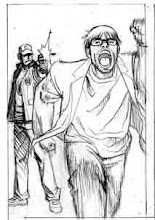It is not difficult for the modern intellectual to concede that the symbolism of mythology has a psychological significance. Particularily after the work of the psychoanalysts, there can be little doubt, either that myths are of the nature of dream, or that dreams are symptomatic of the dynamics of the psyche.
According to this view it appears that through the wonder tales - which pretend to describe the lives of the legendary heroes, the powers of the divinities of nature, the spirits of the dead, and the totem ancestors of the group - symbolic expression is given to the unconscious desires, fears, and tensions that underlie the conscious patterns of human behavior. Mythology, in other words, is psychology misread as biography; history, and cosmology.
The entire spectacle is before us. We have only to read it, study its constant patterns, analyze its variations, and therewith come to an understanding of the deep forces that have shaped man's destiny and must continue to determine both our private and our public lives.
But if we are to grasp the full value of the materials, we must note that myths are not exactly comparable to dream. Their figures originate from the same sources - the unconcious wells of fantasy - and their grammar is the same, but they are not the spontaneous products of sleep. On the contrary, their patterns are conciously controlled. And thei understood function is to serve as a powerful picture language for the communication of traditional wisdom.
They link the unconcious to the field of practical action, not irrationality, in the manner of a neurotic projection, but in such fashion as to permit a mature and sobering, practical comprehension of the fact-world to play back, as a stern control, into the realms of infantile wish and fear.
And so, to grasp the full value of the mythological figures that have come down to us, we must understand that they are not only symptoms of the unconcious but also controlled and intended statements of certain spiritual principles, which have remained as constant throughout the course of human history as the form and nervous structure of the human physique itself.
Psyche life energy = libido
"On Psychic Energy" C.G. Jung
Theory of the Libido
The apprehension of the source of this undifferentiated yet everywhere particularized substratum of being is rendered frustrate by the bery organs through which the apprehension must be accomplished. The forms of sensibility and the categories of human thought, which are themselves manifestations of this power, so confine the mind that it is normally impossible not only to see, but even to concieve, beyond the colorful, fluid, infinitely various and bewildering phenomenal spectacle.
The function of ritual and myth is to make possible, and then to facilitate, the jump - by analogy. Forms and conceptions that the mind and its senses can comprehend are presented and arranged in such a way as to suggest a truth or openness beyond.
Myth is but the penultimate; the ultimate is openness - that void, or being, beyond the categories - into which the mind must plunge alone and be dissolved.
They are mere symbols to move and awaken the mind, and to call it past themselves.
This recognition of the secondary nature of the personality of whatever deity is worshipped is characteristic of most of the traditions of the world. In Christianity, Mohammedanism, and Judaism, however, the personality of the divinity is taught to be final - which makes it comparatively difficult for the members of these communions to understand how one may go beyond the limitations of their own anthropomorphic divinity. The result has been, on the one hand, a general obfuscation of the symbols, and on the other, a god-ridden bigotry such as is unmatched elsewhere in the history of religion.
Sigmund Freud "Moses and Monotheism"
The lapse of superconciousness into the state of unconciousness is precisely the meaning of the Biblical image of the Fall. The constriction of conciousness, to which we owe the fact that we see not the source of the universal power, turns superconciousness into unconciousness and, at the same instanct and by the same token, creates the world. Redemption consists in the return to superconciousness and therewith the dissolution of the world.
The hero is the one who, while still alive, knows and represents the claims of the superconciousness which throughout creation is more or less unconcious. The adventure of the hero represents the moment in his life when he achieved illumination - the nuclear moment when, while still alive, he found and opened the road to the light beyond the dark walls of our living death.
God assumes the life of man and mand releases the God within himself at the mid-point of the crossarms of the same "coincidence of opposites," the same sun door through which God descends and Man ascends - each as the other's food.

No comments:
Post a Comment